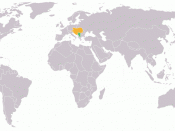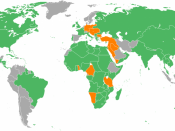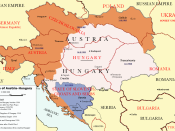How valid is the claim that in 1914 states went to war due to fear rather then motives of gain?Austria's quarrel, Germany's warOne of the theories about the outbreak of the First World War is that nations went to war not to necessarily gain something but mainly because of fear which caused by many different factors.
Europe before the war can be compared to a round-about with the countries involved, Germany being the central pole, speeding up and thus causing the nations into uncontrollable chaos resulting in them breaking off.
The basis of the alliance systems started forming as early as 1871. France and Russia had been supportive of each other ever since France lent Russia money to start industrialization during the reign of Alexander II. The bond between these two great powers was strengthened by their shared enemies, the Central Powers. Their reasons to agree on such alliance, however, were very different.
After the Franco-Prussian war of 1871, in which France lost Alsace and Lorraine, both rich in coal and iron reserves to the Prussians, there was a bitter, revengeful feeling in France-Revanchism. The French believed it was their right to fight a victorious war against Germany and retrieve Alsace and Lorraine. Germany was aware of this and Bismarck demanded 5 billion francs as war reparations, believing that this punishment will cripple France for years. Bismarck was, however, no economist, and Germany was to fear France ever since 1873, when last francs were handed over to Germany.
"German acquisition of Alsace and Lorraine meant that there must be a war between Germany and France" Karl MarxAt the Algeciras conference in Spain, almost all great powers and other nations decided to support the French rights in Morocco during the First Moroccan crisis, leaving Germany without any potential allies except for Austria-Hungary. This 'conspiracy' against Germany led to her fear of encirclement and their alliance, therefore, was not because of strong mutual sympathy or the Gross Deutschland ideal, but simply due to this fear of encirclement- Austria-Hungary was the only option.
As Germany was relatively young, full of energy, ambitions, and primarily a respect-wanting country, its main potential gain- if a war was to break out- would be widening its colonial empire. This is understandable when we realize that in the 19th century power, respect and an empire were tightly tied together.
"From now nothing will happen in the world without Germany and its Kaiser" Wilhelm IIGermany already had some colonies, but this number was relatively small and certainly not big enough to satisfy its aspirations. But even for these colonies a navy was necessary. Therefore, under Admiral Tirpitz, the great improvement of the German navy began with the goal of protecting their existent and potential colonies. However, it was obvious that the main goal is to tease Britain. This turned out to work well; Britain had always been dependant on its navy as it was the best and only way of keeping all prospective threats away from the islands. It could not afford to let Germany develop its navy so drastically, especially because of Germany's strategic position by the North Sea where Britain had her weakest point. This accumulated with Kaiser's arrogance (especially Realpolitik- accomplishes the goal no matter how- murders, blackmailâ¦) and clumsy politics (The Daily Telegraph affair) resulting in a strongly anti-German felling in Britain.
Except for her colonial ambitions, another goal that would come out of a war for Germany was what Von Moltke called "an immediate, preventive war against France and Russia", since Russia was planning on increasing her army from 1.5 to 2.0 million.
Except for the threat of German navy, Britain was not affected by the actions on the continent too much- and it did not want to get affected. It remained in "Splendid isolationism" as Britain's attitude towards continental Europe was described by Lord Salisbury.
"English policy is to float lazily downstream, occasionally putting out a diplomatic boathook to avoid collisions." Lord Salisbury.
As Britain did not have much to gain from a war with the Central powers, it was not clear until the last moments whether it will stick to its promise and join the war on the French side.
In the end, however, the British found something profitable in the war. There were many protests in Britain as socialist parties were emerging. Ireland also wanted its own rule and first suffragettes appeared. A short, successful war would have been a good way of moving the focus of the society on something else. The obvious potential gain was destroying German navy and causing a stop to its growth. This was, on the other hand, too risky, as this could inflict big damage to the British navy.
Slavs looked up to Russia as the mother of all Slavs (this is called Panslavism). The goal of most Slavic nationalists, liberals and intellectuals at the time was to form a state in which all Slavs would live together. This very much concerned Austria-Hungary, Germany's main ally, as many Slavic nations were included in the Austro-Hungarian Empire. It also had its own ambitions in the Balkans (annexation of Bosnia-Herzegovina in 1908). Austria was worried as Serbia was growing stronger and stronger, wanting to form a state similar to later Yugoslavia. Russia supported this Serbian struggle. With Austria-Hungary and her support of the Central powers on one side and Russia with French, and perhaps even British support on the other, the Balkans formed a perfect conflict site.
"We have to crush Serbia like a viper" Austrian commander in chief.
Austria-Hungary and Germany thus had reasons for their slight paranoia. As and addition to this served the image of barbaric hordes from the steppes of Asia, charging the civilized central Europe. This visceral fear and the fact that with the population of 166 million people, Russia had practically unlimited human power reserves (and would be therefore practically undefeatable if there were an adequate amount of equipment) made Russia itself the biggest fear of the Central Powers, as proved by the Schlieffen plan, which stated that it was necessary to focus on Russia after quickly defeating France.
"We cannot compete with the Russian masses." Von MoltkeA perfect example of the fact that nations went to war mostly because of fear and not gain is first war declaration. This was caused by the Russian mobilization, which was a reaction to German aggression towards Prussia. Russia, however, was for now not going to precede any further then a mobilization. But fear and confusion led the Germans into the certainty that Russia is about to attack. German mobilization was then the obvious next step, and The Great War was about to begin.
States therefore did go to war because of fear of different issues. But it must be remembered that without any perspective of profit, there would not be anything to fear in the first place. For example, France's gain would be Germany's loss and thus reasons for war for all countries included both gain and fear aspects. It is, however, obvious that the many miscalculations of mainly, but not only, the German government caused severe confusion and uncertainty about who is actually the one in control, causing this to result in the dominance of fear reasons.
Bibliography: my history teacher






